Artificial Intelligence Help Desk: Transform Customer Service Today!
By Sonaksh Singh Rawat on 2/29/2024 · 5 minute read
Artificial Intelligence (AI) is revolutionizing various sectors worldwide, offering innovative solutions and markedly improving overall efficiency. The customer support industry greatly benefits from this advanced technology, as artificial intelligence help desk integration significantly enhances and streamlines help desk management operations.
The trend towards adopting AI help desk software is anticipated to continue its growth. Projections indicate that by 2025, an impressive 95% of customer interactions will be powered by AI.
How does AI generally work?
Artificial Intelligence (AI) operates through mimicking human intelligence processes. It absorbs knowledge from these different resources, and leverages data to accomplish distinct tasks and goals. Fundamentally, AI works by examining data, recognizing patterns, and autonomously making decisions or predictions grounded in this analysis.
This process underscores AI’s capacity to emulate human thought, execute tasks, and provide resolutions to complex problems. Artificial intelligence help desk can be in multiple sectors, including healthcare, finance, and more.
What is help desk management?
Help desk management involves the process of addressing and resolving both internal and external support inquiries and problems related to a product or service. It encompasses training for support agents, monitoring customer interactions, evaluating team performance, and providing solutions.
Why should you power your help desk with AI?
Integration of artificial intelligence help desk software has shown to greatly enhance efficiency and boost customer satisfaction. The capability of AI to manage multiple customer queries simultaneously elevates both productivity and satisfaction for customer-facing teams.
Furthermore, AI help desk software brings numerous advantages, such as:
- Offering 24/7 support
- Ensuring fast and precise responses
- Automating routine tasks to save time
- Cutting down on operational expenses
- Providing personalized interactions to customers
For teams aiming to elevate their efficiency and effectiveness, integrating AI into their customer support strategy is crucial.
Best ways to use AI for help desk management
Business growth often leads to an increased strain on help desk systems as the customer base expands. This rising demand often exceeds the capabilities of standard help desk features. Mentioned below are a few methods for integrating AI into help desk software, focusing on enhancing performance and simplifying customer support.
1. Sort and route support tickets efficiently
A significant increase in tickets can lead to critical issues being overlooked. Artificial intelligence help desk software helps by segmenting tickets into smaller, more manageable categories to ensure that every issue receives attention.
As requests come in, AI-powered help desk software evaluates them by drawing comparisons to similar recorded cases. It identifies pertinent keywords, assesses their severity, organizes them into categories, and then directs them to the most appropriate agent or team.
For example, tickets containing keywords such as “password,” “login,” and “access” are automatically grouped under “Login Issues” and are assigned to an agent who specializes in resolving login-related problems.
This automated sorting process:
- Keeps the inbox well-organized
- Improves the accuracy of ticket assignments
- Reduces the waiting time for customers
2. Summarize the content of request tickets
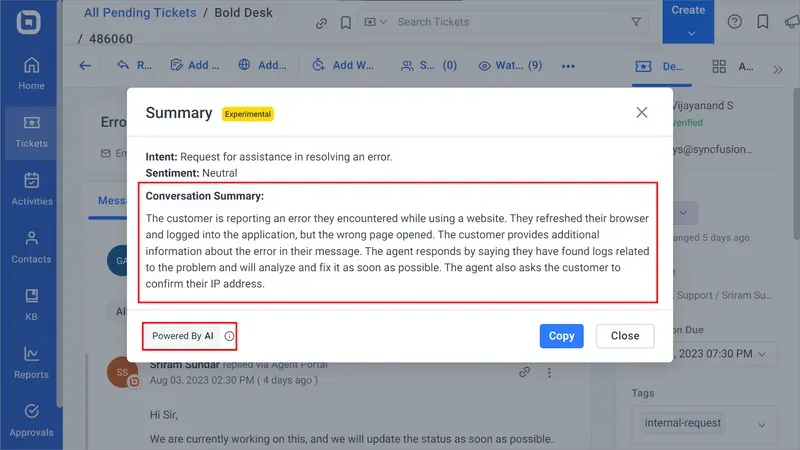
Under the pressure of a high volume of requests and time constraints, accurately interpreting each ticket can present a significant challenge. Artificial Intelligence (AI) technology provides a solution by quickly generating summaries of these tickets, thereby enhancing productivity.
This technology allows for the efficient management of predefined tags and the training of the AI model to efficiently carry out various tasks.
These include understanding the content of tickets, identifying the main issues and linking them to the specific product or service involved. Additioally assessing the urgency level of each ticket, and providing clear summaries of extended interactions between customers and support agents.
3. Perform ticket sentiment analysis
Integration of artificial intelligence help desk platforms offers the advantage of quickly understanding complex details from customer feedback. It assigns a sentiment analysis score to each piece of feedback, which is crucial for monitoring customers’ emotions and tones.
AI help desk software is adept at:
- Analyzing customer sentiments: positive, negative, or neutral
- Identifying the underlying emotional tone behind customer feedback
- Highlighting significant customer experience issues that have the most substantial emotional impact
Such profound insights into customer needs are essential for enhancing products, services, and customer relationships.
4. Offer multilingual support
AI help desk software comes with a significant capability to automatically recognize and translate various languages. Thus making it possible to offer personalized assistance in a number of languages.
The application of this feature to both support tickets and knowledge base articles ensures that communication is clear and effective, thereby eliminating any potential misunderstandings. Such improvements significantly broadens a brand’s global reach and awareness.
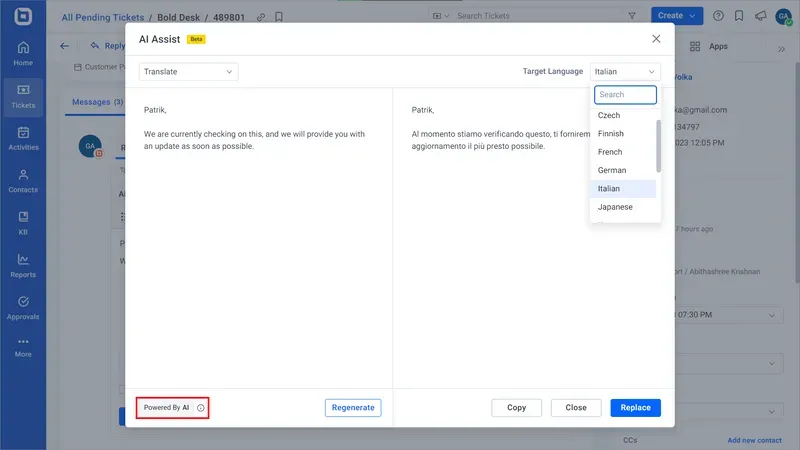
By offering support in multiple languages, it effectively removes potential barriers in customer service, ensuring a smoother experience for users worldwide.
5. Improve article SEO rankings
The integration of Artificial Intelligence (AI) in managing help desks can greatly enhance the search engine optimization (SEO) rankings of articles. Artificial intelligence help desk has the ability to understand the context and intent of search queries. This further aids in generating auto-mapped sitemaps and optimizing keywords for articles that are knowledge-based.
Furthermore, AI-enabled help desks have the capability to analyze competitor information, identify trends, and predict which types of content are most likely to draw in traffic.
Additional AI features in this domain include:
- Creating SEO-friendly titles and meta descriptions for articles
- Identifying content deficiencies to ensure a comprehensive knowledge base
Through leveraging these AI functionalities, content can be tailored more effectively, improving its visibility and rankings on search engine platforms.
6. Provide professional, error-free responses to clients
Artificial intelligence help desk tools significantly enhances help desk operations by assisting agents in crafting responses that meet both professional and brand standards. Through techniques such as rephrasing, elaborating, shortening, translating, and correcting grammar, this technology improves ticket replies and conversations.
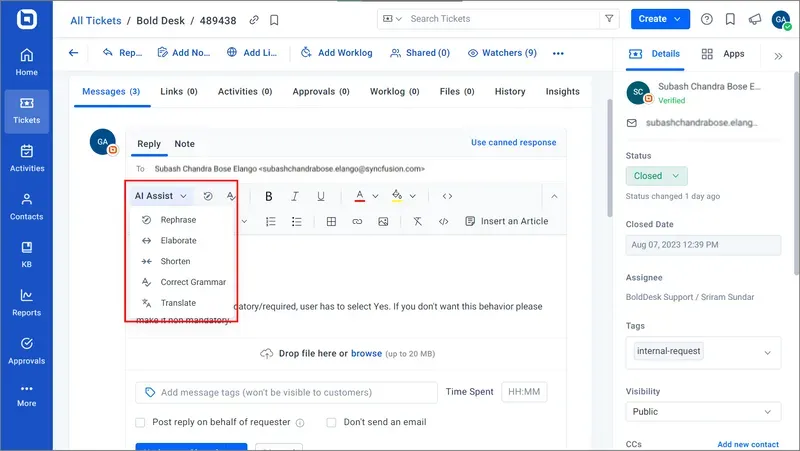
Moreover, by analyzing past interactions, AI help desk software is able to select the most fitting canned response for new inquiries. These improvements are crucial for enhancing customer communication, ensuring messages are effectively conveyed and consistent with the brand’s expectations.
7. Create flawless knowledge base articles
AI plays a pivotal role in enhancing help desk operations by creating high-quality, engaging, and insightful content for knowledge bases. This technology ensures the production of articles that are consistent and standardized, improving grammar, style, and ultimately the structure of the content.
There are various AI-powered editing tools designed to create superior articles, as follows:
- Rephrase tool: Enables the rewriting of text to achieve a more professional tone, with options for standard, fluent, or professional rephrasing.
- Elaborate tool: Allows for the expansion of selected content, making it more informative with customizable tone and length.
- Shorten tool: Trims unnecessary words and phrases to keep the text concise without altering its intended meaning.
- Correct grammar tool: Improves text quality by correcting any grammatical errors, ensuring polished and error-free responses.
- Translate tool: Offers the ability to translate content into various languages directly within the platform, increasing the accessibility of the information.
AI-powered knowledge-based article editing tools signify a major leap forward in making the creation and management of help desk content more efficient and refined.
8. Promote self-service
Incorporating artificial intelligence help desk into your customer service operations significantly enhances the user experience by automatically recommending relevant informative articles based on search keywords.
This technology not only deepens the user’s understanding of their inquiries but also promotes a culture of self-service.
For example, when a search is performed for “refund policy,” the AI-powered help desk will search through the organized knowledge base to provide related articles, FAQ pages, and video tutorials regarding refunds.
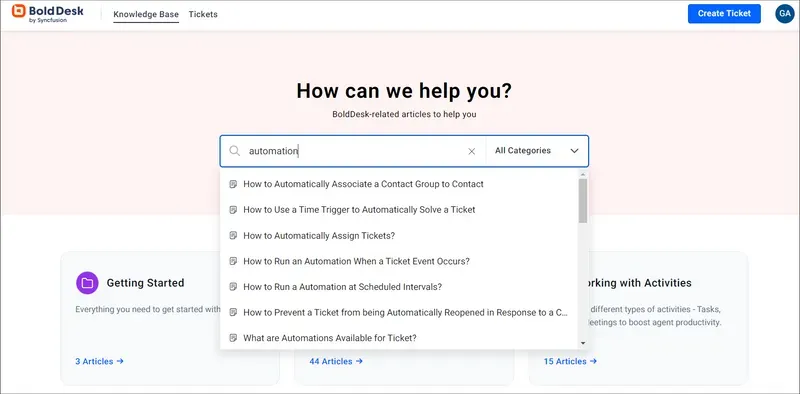
Moreover, an article summary feature is available that creates summaries for lengthy articles by highlighting their key points. This ensures that information is delivered in a more concise and accessible manner.
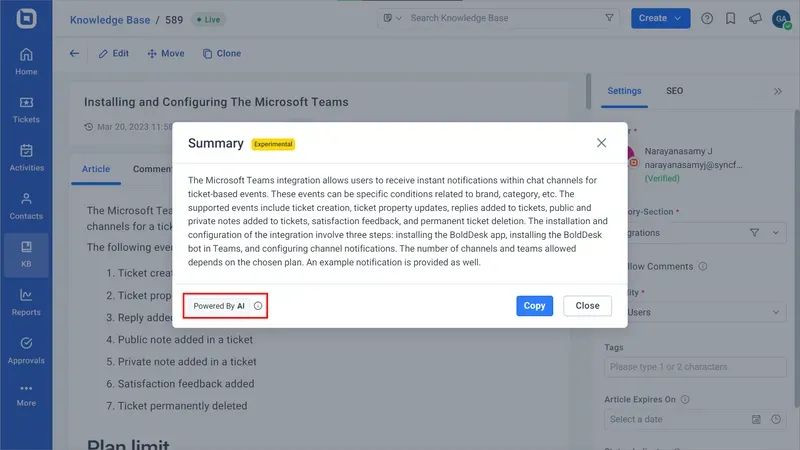
9. Generate reports and analytics
An artificial intelligence help desk can analyze customer interactions, feedback, and inquiries to gain insights into customer behavior, preferences, and satisfaction levels.
By leveraging this information, it is possible to anticipate future customer needs, improve customer service, and tailor communication more effectively.
Moreover, AI excels at evaluating and reporting on agent performance, using key metrics like ticket response times, resolution rates, and work logs. These reports and dashboards are crucial for identifying areas that need improvement.
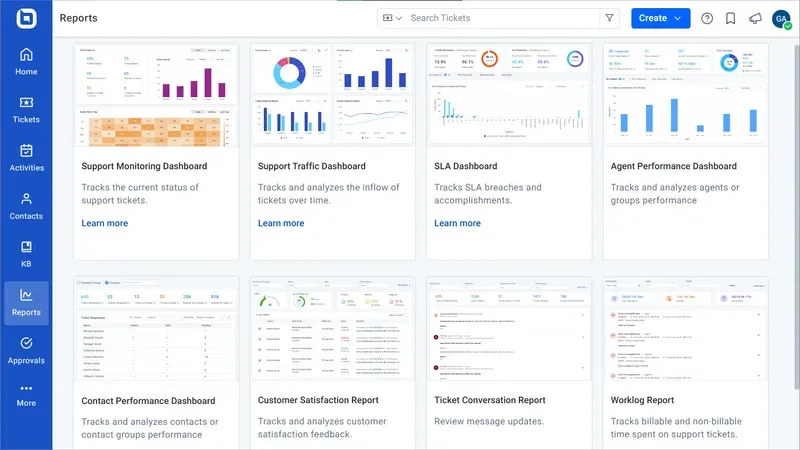
Potential challenges in implementing AI help desk management
The incorporation of AI can significantly increase efficiency and enhance support processes, yet it introduces a set of considerations that must be handled with care during its implementation.
1. Integration Ramifications: Integrating artificial intelligence help desk in on-going processes and systems requires considerable time and technical know-how to ensure it works smoothly. It’s crucial to engage in thorough strategizing and planning to navigate this challenge effectively.
2. Data Privacy and Security Risks: Employing AI in help desks for managing sensitive customer data introduces potential concerns around data privacy. Ensuring the presence of strong security protocols is vital to safeguard against these risks.
3. User Technophobia: The adoption of AI technology within help desks might initially meet with hesitation or resistance from both staff and customers. Providing comprehensive training on the advantages of AI is key to addressing these concerns.
4. Cost Implications: The initial setup for an artificial intelligence help desk requires a substantial financial investment, which includes expenses for AI software, integrations, customization, and training for users. Additionally, the need for ongoing maintenance and updates calls for careful financial planning.
Revolutionize your customer support with an AI help desk
The utility of AI, which continuously learns and increases accuracy with each interaction, is seen as a vital component for enhancing customer support capabilities. Embracing these concepts allows businesses to move away from outdated and inefficient methods, maintaining their competitive edge.
For businesses seeking an advanced artificial intelligence help desk management system to improve agent productivity and offer superior customer support, it is recommended to consider solutions that leverage AI technology.